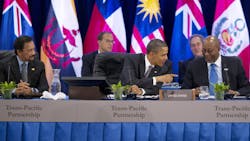SYDNEY — Australian trade minister Andrew Robb said on Thursday that the massive Pacific trade pact could be concluded in the “next three to four weeks,” when the 12 nations involved are due to meet.
Expectations that the Trans-Pacific Partnership (TPP), an accord that would encompass 40% of global trade, would be sealed this year increased after President Barack Obama was given fast-track authority by Congress last month to negotiate such deals.
“The critical thing was for (Obama) to get the authority,” Robb told The Australian in an interview published Thursday. “We are going to meet sometime in the next three to four weeks. We should be able to conclude it. ... That may well be the last negotiating round, in which case it then has to go through all the hoops in all the different countries, but it could be at a stage where we can all shake on it.”
The ambitious TPP — pushed for by the United States, and which excludes China — has potential signatories including Australia, Brunei, Canada, Chile, Japan, Malaysia, Mexico, New Zealand, Peru, Singapore and Vietnam.
Supporters of the proposed deal have said it will free up trade in the region, reduce regulation and increase job opportunities. But critics have argued it would benefit big business rather than the general public and lead to a rise in the price of medications, fewer Internet freedoms and environmental damage.
A point of concern has been ISDS, the so-called investor-state dispute settlement, which allows firms to sue national governments if they feel that local laws violate a trade deal and threaten their investments.
Robb said Australian opponents of the TPP “have a right to question” it, but added that they were just against free trade.
“They are the same critics — no matter which trade agreement — who are always there,” he told the newspaper. “They are anti-trade, anti-large global organizations, they want the world to stay as it is.”
Copyright Agence France-Presse, 2015
About the Author
Agence France-Presse
Copyright Agence France-Presse, 2002-2025. AFP text, photos, graphics and logos shall not be reproduced, published, broadcast, rewritten for broadcast or publication or redistributed directly or indirectly in any medium. AFP shall not be held liable for any delays, inaccuracies, errors or omissions in any AFP content, or for any actions taken in consequence.
